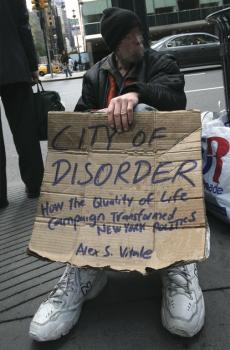ТОП просматриваемых книг сайта:
Alex S. Vitale
Список книг автора Alex S. VitaleАннотация
2009 Association of American University Presses Award for Jacket Design In the 1990s, improving the quality of life became a primary focus and a popular catchphrase of the governments of New York and many other American cities. Faced with high levels of homelessness and other disorders associated with a growing disenfranchised population, then mayor Rudolph Giuliani led New York's zero tolerance campaign against what was perceived to be an increase in disorder that directly threatened social and economic stability. In a traditionally liberal city, the focus had shifted dramatically from improving the lives of the needy to protecting the welfare of the middle and upper classes—a decidedly neoconservative move.In City of Disorder , Alex S. Vitale analyzes this drive to restore moral order which resulted in an overhaul of the way New York views such social problems as prostitution, graffiti, homelessness, and panhandling. Through several fascinating case studies of New York neighborhoods and an in-depth look at the dynamics of the NYPD and of the city's administration itself, Vitale explains why Republicans have won the last four New York mayoral elections and what the long-term impact Giuliani's zero tolerance method has been on a city historically known for its liberalism.
Аннотация
How the police endanger us and why we need to find an alternative Recent years have seen an explosion of protest and concern about police brutality and repression—especially after long-held grievances in Ferguson, Missouri, erupted in months of violent protest following the police killing of Brown. Much of the conversation has focused on calls for enhancing police accountability, increasing police diversity, improving police training, and emphasizing community policing. Unfortunately, none of these is likely to produce results, because they fail to get at the core of the problem. The problem is policing itself—the dramatic expansion of the police role over the last forty years. This book attempts to jog public discussion of policing by revealing the tainted origins of modern policing as a tool of social control and demonstrating how the expanded role of the police is inconsistent with community empowerment, social justice—even public safety. Drawing on first-hand research from across the globe, Alex Vitale shows how the implementation of alternatives to policing, like drug legalization, regulation, and harm reduction instead of the policing of drugs, has led to reductions in crime, spending, and injustice.


